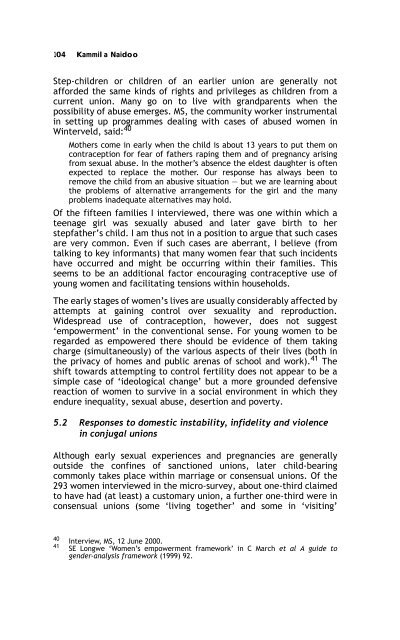Sex, Gender, Becoming - PULP
Sex, Gender, Becoming - PULP
Sex, Gender, Becoming - PULP
You also want an ePaper? Increase the reach of your titles
YUMPU automatically turns print PDFs into web optimized ePapers that Google loves.
104 Kammila Naidoo<br />
Step-children or children of an earlier union are generally not<br />
afforded the same kinds of rights and privileges as children from a<br />
current union. Many go on to live with grandparents when the<br />
possibility of abuse emerges. MS, the community worker instrumental<br />
in setting up programmes dealing with cases of abused women in<br />
Winterveld, said: 40<br />
Mothers come in early when the child is about 13 years to put them on<br />
contraception for fear of fathers raping them and of pregnancy arising<br />
from sexual abuse. In the mother’s absence the eldest daughter is often<br />
expected to replace the mother. Our response has always been to<br />
remove the child from an abusive situation — but we are learning about<br />
the problems of alternative arrangements for the girl and the many<br />
problems inadequate alternatives may hold.<br />
Of the fifteen families I interviewed, there was one within which a<br />
teenage girl was sexually abused and later gave birth to her<br />
stepfather’s child. I am thus not in a position to argue that such cases<br />
are very common. Even if such cases are aberrant, I believe (from<br />
talking to key informants) that many women fear that such incidents<br />
have occurred and might be occurring within their families. This<br />
seems to be an additional factor encouraging contraceptive use of<br />
young women and facilitating tensions within households.<br />
The early stages of women’s lives are usually considerably affected by<br />
attempts at gaining control over sexuality and reproduction.<br />
Widespread use of contraception, however, does not suggest<br />
‘empowerment’ in the conventional sense. For young women to be<br />
regarded as empowered there should be evidence of them taking<br />
charge (simultaneously) of the various aspects of their lives (both in<br />
the privacy of homes and public arenas of school and work). 41 The<br />
shift towards attempting to control fertility does not appear to be a<br />
simple case of ‘ideological change’ but a more grounded defensive<br />
reaction of women to survive in a social environment in which they<br />
endure inequality, sexual abuse, desertion and poverty.<br />
5.2 Responses to domestic instability, infidelity and violence<br />
in conjugal unions<br />
Although early sexual experiences and pregnancies are generally<br />
outside the confines of sanctioned unions, later child-bearing<br />
commonly takes place within marriage or consensual unions. Of the<br />
293 women interviewed in the micro-survey, about one-third claimed<br />
to have had (at least) a customary union, a further one-third were in<br />
consensual unions (some ‘living together’ and some in ‘visiting’<br />
40 Interview, MS, 12 June 2000.<br />
41<br />
SE Longwe ‘Women’s empowerment framework’ in C March et al A guide to<br />
gender-analysis framework (1999) 92.
















